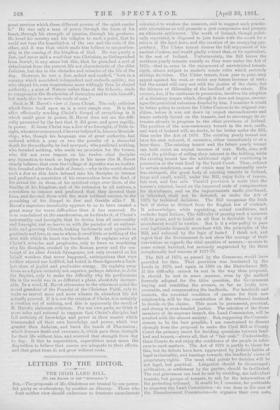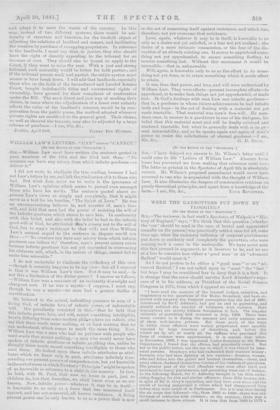LETTERS TO THE EDITOR.
THE IRISH LAND BILL. ere THE EDITOR OF THE "SPECTATOR."] SIR,—The,proposals of .Mr. Gladstone are treated by one power- ful party as confiscatory, by another as illusory. Those who dopt neither view should endeavour to frustrate amendments calculated to weaken the measure, and to suggest such practic- able alterations as \sill promote a just compromise and prepare an ultimate settlement. The north of Ireland, though politi- cally separated, is disposed to join hands with the south for a reform of the land-laws, and the creation of an occupying pro- prietaty. The Ulster tenant desires the full enjoyment of his ancient Custom, and would gladly extend that, or its equivalent, to the rest of Ireland. Unfortunately, the Bill leaves the northern yearly tenants exactly as they were under the Act of 1870,—that is, some in the enjoyment of unrestricted tenant- right, others subject to modern estate rules which seriously abridge its value. The Ulster tenant, from year to year, may appeal against his rent, or resist any future increase of rent; but the award will vary not with the justice of the claim, but the fairness or illiberality of the landlord of the estate. His success, too, if he continues in possession, involves his adoption. of a statutory tenure which, though it does not impose, encour- ages the periodical valuation dreaded by him. I consider it would be better policy to restore the Ulster Custom to its original con- dition, before it was cut down by unjust encroachments and leases unfairly forced on the tenants, and to encourage its ex- teusion already in progress to the other provinces of Ireland. The position of the non-customary tenant in the east, south, and west of Ireland will, no doubt, be far better under the Bill, than under the Act of 1870. The existing yearly tenant can have his rent reduced, if excessive, either immediately or at a later time. The existing tenant and the future yearly tenant can both resist an unjust increase of rent. Both, also, will cu joy the privilege of selling their interest in the holding, while the existing tenant has the additional right of continuing in possession at the rent fixed by the Land Court. Thus, subject to certain conditions, sonic of which may be reasonably made less stringent, the great body of existing tenants in Ireland, large and, small, would, under the Bill, enjoy fixity of tenure, fair rent, and free sale. Careful provision is made that the tenant's interest, based on the improved scale of compensation for disturbance, and on the improvements made, purchased, or inherited, shall not be defeated, as under the Act of 1870, by technical decisions. The Bill recognises the Irish fact of status as distinct from the English law of contract. It acknowledges, while regulating, actual conditions, and excludes legal fictions. The difficultrof passing such a measure will be great, and to insist on all that is desirable by way of amendment would. be unwise. But is it a wise policy to pass over legitimate demands accordant with the principles of the Bill, and enforced by the logic of facts p I think not, and. regret that the Government do not show the courage of their convictions as regards the vital question of arrears,—arrears to some extent habitual, but seriously augmented by the three exceptionally bad seasons of 1877-79.
The Bill of 1870, as passed by the Commons, would have provided for this. That provision was frustrated. by the Lords in 1870, and again in 1880 on the Disturbance Bill. If the difficulty cannot be met in the way thus proposed, it should be met in some manner, even by the method formerly adopted for the tithe question, the Government buying and remitting the arrears, so far as justly irre- coverable, and compensating the landlords. For landlords and tenants, the essential condition of success for their new relationship will be the constitution of the tribunal destined. to decide on the claims. This must be permanent, practical, and strong in even-handed justice. The selection of the three members of its supreme branch, the Land Commission, will be awaited with the utmost anxiety. But, supposing the Commis- sioners to be the best possible, I am constrained to dissent strongly from the proposal to make the Civil Bill or County Court the primary resort for deciding questions between land- lord and tenant,—above all, that of "fair rent." Undoubtedly, these Courts do not enjoy the confidence of the people in refer- ence to such matters. The Act of 1870 is partly to blame for this, but its defects have been aggravated by judicial habits of legal technicality, and leanings towards the landlords' views of proprietary rights. The most vital points for decision will be not legal, but practical. Litigation should be discouraged ; arbitration, or settlement by the parties, should be facilitated.
The real grievances can best be met by enabling, not individual tenants, but groups of tenants, to ask for the intervention of the protecting tribunal. It would be, I conceive, far preferable
to empower the Land Commission—as was done in the case of the Disendowmeut Commission—to organise their own code, ,uud adapt it to meet the wants of the country. In this ,way, instead of two different systems, there would be uni- formity of structure and function, for the twofold object of adjusting the relations of landlord and tenant, and facilitating the creation by purchase of occupying proprietors. In reference • to the landlords, I must say that, in justice, they also should have the right of directly appealing to the tribunal for an increase of rent. They should also be bound to apply to the Court, if they want to raise the rent. with a just and strong tribunal, such mutuality would be better for both parties ; and if the tribunal proves weak and partial, the entire system must sooner or later break down. I will add that landlords, especially 'those who, on the faith of the Incumbered and Landed Estates Court, bought indefeasible titles and unrestricted rights of ownership, have ground for their complaint of confiscation under the Bill. The most direct and just way of meeting their claims, in cases where the adjudication of a lower rent unfairly -affects the value of the landlord's interest, would be by com- pensation from the public purse, the method adopted wherever private rights are sacrificed to the general good. Their claims, as well as thosesof the tenants, may also be adjusted by a large
• scheme of purchase.—I am, Sir, &c.,
'Dublin', April 20th. HE•sar- Dix.111:TTox.



































 Previous page
Previous page